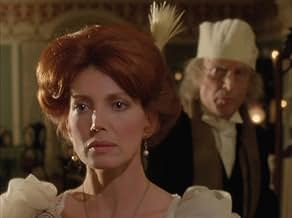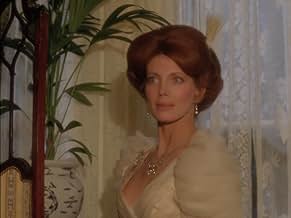A Scandal in Bohemia
- Episode aired Apr 24, 1984
- TV-PG
- 54m
IMDb RATING
7.9/10
1.7K
YOUR RATING
Sherlock Holmes finds himself evenly matched when he is employed by the King of Bohemia to retrieve an indiscreet photograph from the American actress and singer, Irene Adler.Sherlock Holmes finds himself evenly matched when he is employed by the King of Bohemia to retrieve an indiscreet photograph from the American actress and singer, Irene Adler.Sherlock Holmes finds himself evenly matched when he is employed by the King of Bohemia to retrieve an indiscreet photograph from the American actress and singer, Irene Adler.
David Baukham
- 1st Big Man
- (as David Bauckham)
John Graham-Davies
- 1st Young Man
- (as John Graham Davies)
Featured reviews
A Scandal in Bohemia has its share of "firsts." It was the first short story to feature Sherlock Holmes (after Arthur Conan Doyle introduced the character in his novel, A Study in Scarlet), it was the first episode of the excellent Granada series, and as such, it was the first time the viewing audience had the pleasure of seeing Jeremy Brett in the role of Holmes. It was also the first Granada episode I ever watched.
I went into the Granada series not knowing what to expect. I'd heard many great things said about it, and particularly about Brett, but I had no real expectations. So I decided to give it a go, and to begin at the beginning. Within a few minutes of starting A Scandal in Bohemia, I leapt out of my seat and ran to grab my favorite collection of Sherlock Holmes tales. The reason being that, although I hadn't read A Scandal in Bohemia in some time, I found that it was all coming back to me as I watched the episode. I was literally shocked by how faithful it was, and had to check the story just to be sure that it really was staying as true to the source material as it seemed to be. And indeed, it was.
Throughout the course of the various Granada Holmes series, they would consistently remain true to the source material...or, in the instances where they strayed (mostly in the feature- length adventures), at least remain true to the SPIRIT. This was quite refreshing to me, as someone who loved the stories, and had seen countless adaptations that had strayed so far from what made them great. A Scandal in Bohemia was, to that time, the most faithful Holmes adaptation I had ever seen...and, along with many of the other wonderful Granada episodes, it's still among the most faithful.
Jeremy Brett, as Holmes, is superb from the word "Go." His magnificent performance in this episode engaged me instantly, and prepared me for the 40 adventures to follow...during which time, I would come to embrace his Holmes as THE definitive screen characterization of the world's greatest detective. Brett is the character of Sherlock Holmes come to life. Everything that he was in the stories, and everything that he often WASN'T in other adaptations, Jeremy Brett had it...and his presence alone made each and every episode a delight to watch.
David Burke also bears mentioning here, as a fantastic Watson to Brett's Holmes. Not at all in the Nigel Bruce mold, a characterization which has dogged many other adaptations throughout the years, Burke brings a charm and quiet intelligence to the role that complements Holmes's eccentric brilliance perfectly and, as with anything else in this episode, stays true to the essence of Conan Doyle's original story. Burke would serve as a faithful and amiable Watson throughout the run of The Adventures of Sherlock Holmes, before being replaced by the equally capable and likable Edward Hardwicke.
As an initiation into the Granada Holmes entries, A Scandal in Bohemia served its purpose admirably. I was struck by how faithful it was, how capable the direction and production design were, and how wonderful the performances were. It was as if someone had breathed life into Conan Doyle's story and raised it from the page for all to see. Suffice it to say, I was mightily impressed, and have been a devotee of the Granada Holmes series, and Jeremy Brett, ever since.
I went into the Granada series not knowing what to expect. I'd heard many great things said about it, and particularly about Brett, but I had no real expectations. So I decided to give it a go, and to begin at the beginning. Within a few minutes of starting A Scandal in Bohemia, I leapt out of my seat and ran to grab my favorite collection of Sherlock Holmes tales. The reason being that, although I hadn't read A Scandal in Bohemia in some time, I found that it was all coming back to me as I watched the episode. I was literally shocked by how faithful it was, and had to check the story just to be sure that it really was staying as true to the source material as it seemed to be. And indeed, it was.
Throughout the course of the various Granada Holmes series, they would consistently remain true to the source material...or, in the instances where they strayed (mostly in the feature- length adventures), at least remain true to the SPIRIT. This was quite refreshing to me, as someone who loved the stories, and had seen countless adaptations that had strayed so far from what made them great. A Scandal in Bohemia was, to that time, the most faithful Holmes adaptation I had ever seen...and, along with many of the other wonderful Granada episodes, it's still among the most faithful.
Jeremy Brett, as Holmes, is superb from the word "Go." His magnificent performance in this episode engaged me instantly, and prepared me for the 40 adventures to follow...during which time, I would come to embrace his Holmes as THE definitive screen characterization of the world's greatest detective. Brett is the character of Sherlock Holmes come to life. Everything that he was in the stories, and everything that he often WASN'T in other adaptations, Jeremy Brett had it...and his presence alone made each and every episode a delight to watch.
David Burke also bears mentioning here, as a fantastic Watson to Brett's Holmes. Not at all in the Nigel Bruce mold, a characterization which has dogged many other adaptations throughout the years, Burke brings a charm and quiet intelligence to the role that complements Holmes's eccentric brilliance perfectly and, as with anything else in this episode, stays true to the essence of Conan Doyle's original story. Burke would serve as a faithful and amiable Watson throughout the run of The Adventures of Sherlock Holmes, before being replaced by the equally capable and likable Edward Hardwicke.
As an initiation into the Granada Holmes entries, A Scandal in Bohemia served its purpose admirably. I was struck by how faithful it was, how capable the direction and production design were, and how wonderful the performances were. It was as if someone had breathed life into Conan Doyle's story and raised it from the page for all to see. Suffice it to say, I was mightily impressed, and have been a devotee of the Granada Holmes series, and Jeremy Brett, ever since.
Although it's apparently the first Sherlock Holmes story, this is nevertheless a curious choice to start off the TV series, since the story involves a king and a woman whom Sherlock admits "has a face to die for." Purely an observation on Sherlock's part, of course. But it could easily mislead the first-time viewer, as if this new series would involve the titular character in majestic cases with kings, or have love interests. Which wouldn't be too surprising, considering how far from the source material the countless other adaptations before (and since) have strayed.
Luckily, that's not the case. This is a great story, wonderfully produced and a great start. Jeremy Brett and David Burke's performances here are the key; they would either persuade you to give the rest of the series a chance, or dismiss it altogether from the start. Since they are both perfect fits for their parts, everything works.
Holmes is contacted and employed by a king, who fears that a lady from a past relation may want to ruin his upcoming wedding, which could have an impact on European history. This is no ordinary lady, she's very liberal for her time, an opera singer, and very attractive. However, as Holmes finds out soon, she wants nothing to do with the king.
Although the two title performances are always great (and I must also compliment Rosalie Williams as Mrs. Hudson, who is always a joy to see) for me, the main attraction of the Granada series has always been the production values: the sets, costumes, manners of speech and walking, faithfulness to the original material and dialogue, and the general atmosphere of the final work. This episode, like many others, delivers in all these aspects. It's far from being my favorite, but I can always enjoy it when I catch it.
Luckily, that's not the case. This is a great story, wonderfully produced and a great start. Jeremy Brett and David Burke's performances here are the key; they would either persuade you to give the rest of the series a chance, or dismiss it altogether from the start. Since they are both perfect fits for their parts, everything works.
Holmes is contacted and employed by a king, who fears that a lady from a past relation may want to ruin his upcoming wedding, which could have an impact on European history. This is no ordinary lady, she's very liberal for her time, an opera singer, and very attractive. However, as Holmes finds out soon, she wants nothing to do with the king.
Although the two title performances are always great (and I must also compliment Rosalie Williams as Mrs. Hudson, who is always a joy to see) for me, the main attraction of the Granada series has always been the production values: the sets, costumes, manners of speech and walking, faithfulness to the original material and dialogue, and the general atmosphere of the final work. This episode, like many others, delivers in all these aspects. It's far from being my favorite, but I can always enjoy it when I catch it.
I can't express the joy I felt when I heard that a series of Sherlock Holmes episodes was to appear on public television, and that they would be faithful, for the most part, to the original canon. I've seen them all a few times and decided to throw my two cent's worth into the mix. The first episode, "A Scandal in Bohemia," generally accepted as the first story published, gets things off on the right foot. We are introduced to Jeremy Brett, a quirky, self-absorbed Holmes, who puts his own stamp on the character. His Watson is portrayed, not as the bumbling incompetent, but as a worthy assistant who had the intelligence to write and publish the stories of his amazing friend (though seldom given credit for it by his mentor). This episode has several things to recommend it. He has a worthy adversary in Irene Adler. At no time is she the defenseless female of the Victorian novel. We have a masterful plot by Holmes to gain entrance into the woman's house to fetch the damning correspondence. We have Holmes at his best, disguising himself as he often did. We have a case of poetic justice. We also have Holmes dealing with a romantic fixation on the "one" woman. The performances are solid, the milieu of the period is nicely recreated, and we have interpretations of characters that are quite satisfying. It's too bad Irene never appears again, but then Conan-Doyle probably wasn't into sequels.
Jeremy Brett's reign as Conan Doyle's famous detective kicked off with this story, one of Conan Doyle's better known tales. Hard to believe this was made back in 1984, it boasts glorious production values, it is wonderfully opulent and decadent, they went for dramatic, a touch of theatre. Glorious costumes and visuals, it's a definite treat upon the eyes, but it's the performances that make this, Brett is incredible in his first outing, his disguises are hugely entertaining, reminiscent of those donned by Basil Rathbone. David Burke does a fine job as Watson, I've always liked both him and Hardwicke equally. Gayle Hunnicutt is utterly glorious as Irene Adler, she has a delicate beauty, and a softness which the character demanded, Wolf Kahler certainly looked the part of the King of Bohemia.
Not my favourite story, as I felt there were better to come, but it's a solid opener, and worth watching for the fine performances. 8/10
Not my favourite story, as I felt there were better to come, but it's a solid opener, and worth watching for the fine performances. 8/10
Sherlock Holmes is hired by the King of Bohemia to retrieve a photograph from one Irene Adler. Ms Adler and the King had a relationship several years earlier, the publication of which would jeopardise his imminent betrothal to the Princess of Scandinavia. Holmes finds himself up against a formidable opponent.
A great start to the series. Quite low-key by Holmes's standards as it doesn't involve a murder or a robbery or even the solving of a crime but intriguing and interesting nevertheless.
We are also introduced to Holmes and Watson and the world in which they live. A good way to get into the series.
A great start to the series. Quite low-key by Holmes's standards as it doesn't involve a murder or a robbery or even the solving of a crime but intriguing and interesting nevertheless.
We are also introduced to Holmes and Watson and the world in which they live. A good way to get into the series.
Did you know
- TriviaThe episode begins with an exchange between Watson and Holmes regarding Holmes' drug use, asking "Morphine or cocaine?" Holmes specifies his preference for a 7% solution of cocaine, and that he requires stimulants to deal with stagnation. This dialogue is actually from the story "The Sign of Four". In Conan Doyle's "A Scandal in Bohemia," Watson merely makes a passing reference to cocaine, curiously referring to "the drowsiness of the drug."
- GoofsThe streets of London are regularly covered with tarmac even though this was not invented before 1901. This episode is supposed to take place circa 20 years earlier.
- Quotes
Sherlock Holmes: She is a lovely woman, Watson, with a face that a man might die for.
Dr. John Watson: "A face a man might die for?" Unusual language for you, Holmes.
Sherlock Holmes: A metaphor, Watson, nothing else.
- ConnectionsFeatured in La galerie France 5: Sherlock Holmes contre Conan Doyle (2018)
- SoundtracksCan Can
Written by Jacques Offenbach
Details
Contribute to this page
Suggest an edit or add missing content



















